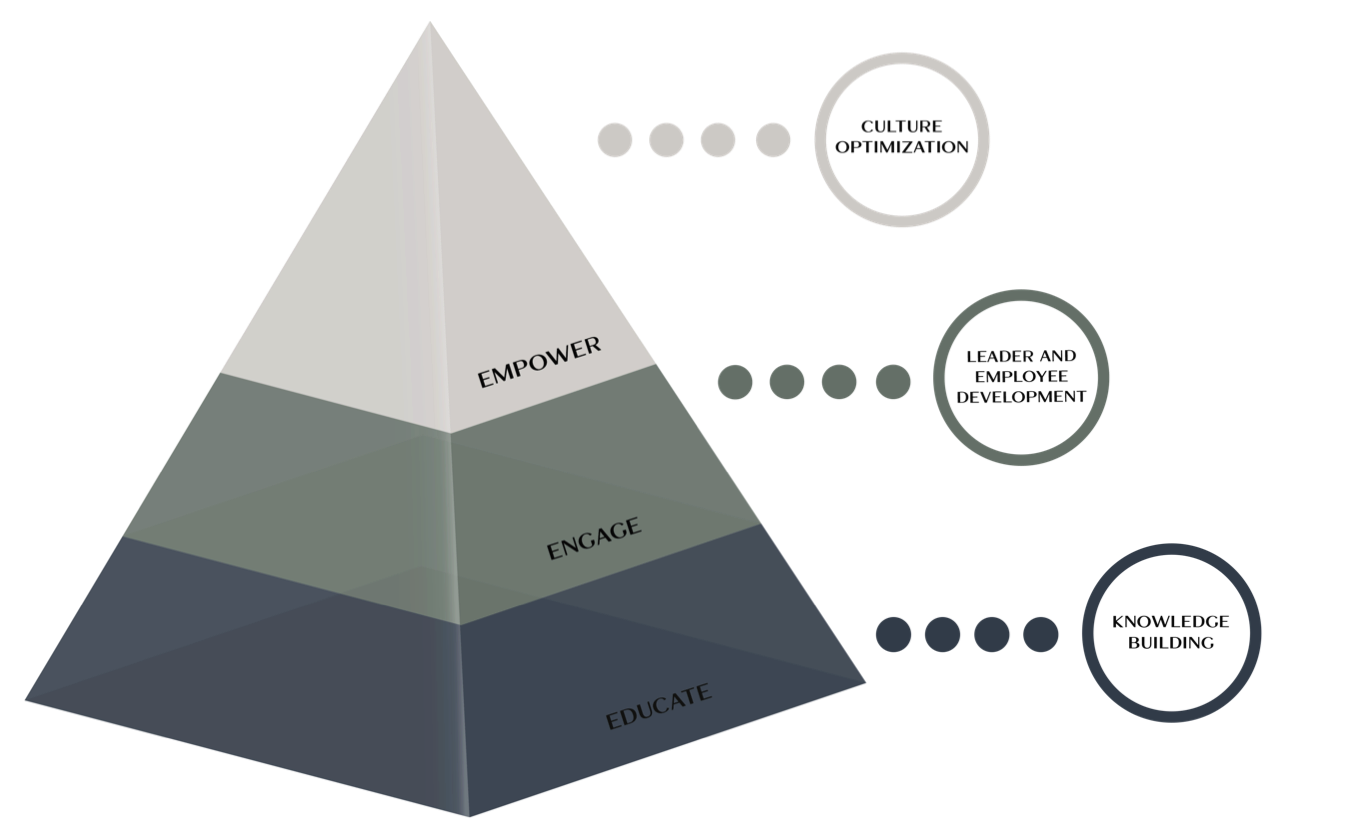Change Leadership: The role of the Education building block in the 3E Pyramid (A Series on Frameworks in Change Leadership)

In my introductory article about change leadership, I discussed the 3Es interdependent framework I use with individuals and groups pursuing change. The three Es are Educate, Engage, and Empower. In this article, we’ll take a deeper dive on the Education building block.

Why start with Education? I would ask you to think about where you usually start. Most of us got started in our careers with some kind of relevant education whether it was through specialty collegiate education, certifications, or on-the-job training. We needed know-how to do our work. Also, I find that the first, and often last, recommendation people have for instituting a change (e.g. process, practice, guideline, behavior, etc.) is education. It’s an important starting point and an important foundation.
Also, we know from many sources, such as the book of Proverbs, that knowledge increases understanding which leads to wisdom. That is another framework for a different day, but provides a backdrop for why knowledge-building or education as a building block is foundational and critical. We have to get and give information if we want to have a common language and a shared understanding in order to achieve an optimum state of sustainable change. Plus, under the concept of reliability building, which is related to sustainable change, education gets us to the first level of creating stability which is needed to advance system performance.
So now we know a little bit about why knowledge building is important, but we should also discuss where it can be applied and how. Where or what it can be applied to is broad and far-reaching so I’ll just provide a few examples based on where I spend my most of my time in my practice, which is leadership development, organizational performance improvement, and problem solving - in particular complex and wicked problems.
Knowledge-building could be as simple as educating people on “need-to-know” or “how-tos,” but I encourage leaders to think more broadly. Education, or knowledge-building has an emphasis on capability and capacity building.
Leaders and Knowledge-Building
At the leadership level, this might look like developing leadership and management skills you might not have learned in your education - especially for those who were trained in a particular area of expertise such as, but not limited to Information Services, Healthcare, Engineering, Law, Education. Allow me to digress on subject matter experts for a moment. For those of you who might be these people or who have these leaders on your team, you know how leadership emerged. These leaders often get to leadership because they’re great experts, high performers in their unique roles, and well-respected by their peers. But, they or you often weren’t trained to be equally expert as leaders of the business or other people. In fact, you might have had almost no training in this area or have had just enough to know the lingo. Building knowledge in this area will lead to greater success not only for the leader, but for the people and the business they lead.
General Workforce and Performance Improvement Knowledge-Building
For any level in the organization, an important area of knowledge building is Performance Improvement. This creates a mechanism for reducing frustration and rework or ensuring reliable delivery of services and customer experiences. No, you don’t have to have everyone certified in a brand of Performance improvement, but you can make some meaningful and sustainable changes when you learn basic organizing frameworks and tools for how to do Performance Improvement.
Why do I promote Performance Improvement as an important learning factor for education? Think about how many times you’ve worked on an idea and it felt like throwing spaghetti at the wall to see what stuck. Or, how often have you come up with an idea and couldn’t get it off the ground? Or, when have you implemented something across the board only to find it wasn’t the right idea? Additionally, and possibly more frustrating, is the effort you might have put in to get an improvement or change implemented, but it didn’t stick because you didn’t know how to plan for the need to adjust and/or monitor over time. Skills related to performance improvement are golden for getting ideas from your team; having an organized and planned approach for managing a project or even your day to day work; and for not wasting time on efforts that don’t go anywhere.
Questions to consider

When considering where education and knowledge-building should take root, you’ll want to consider where the needs lie and how to fill them. It takes thought, clarity, preparation and communication. Leaders can ask themselves questions such as:
- What information and understanding do I need about the current situation?
- What information and understanding am I lacking that I need to find out?
- What am I trying to impact and why?
- Who benefits from the change, how, and why?
- What are the costs or pains if this change doesn’t occur?
- What skills, competencies, or capabilities are needed to design this change and carry it out? Who needs these?
- What steps are needed to build those skills, competencies, or capabilities?
- How will I know the education is complete or effective?
This is by no means a comprehensive list, but should provide insight to how a leader should be thinking broadly about knowledge-building and education, whether it is for oneself or a team.
What else would you ask to ensure appropriate knowledge-building? How else do you use education and knowledge-building to lead change? I hope you will leave a comment or reach out to me directly.
In the next article, I’ll discuss Engagement which includes leadership commitment and leader / employee development. Until then, I look forward to an opportunity to hear your thoughts, experiences, and challenges in this type of work as well as your feedback on the information.
Photo Credits:
Janko Ferlic at Pexels
Bruno Scramgnon at Pexels
